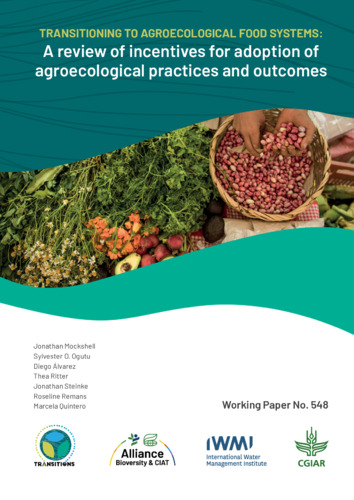Transitioning to agroecological food systems: A review of incentives for adoption of agroecological practices and outcomes
Food systems are increasingly threatened by climate change, natural resource degradation, rapid population growth, and shifting diets. Sustainable agricultural practices labeled as “agroecology” have been promoted as one of the possible solutions to current food systems challenges. Agroecological principles and/or practices have the potential to contribute to the Sustainable Development Goals of ending hunger, reducing negative environmental impacts, and achieving food and nutrition security. Although incentives for adoption of agroecological practices are critical to the transition towards sustainable food systems, there is limited in-depth reviews that provide an understanding of the existing incentive mechanisms and their relationship with adoption of agroecological practices and economic, environmental, and social outcomes. This scoping review examines incentive mechanisms in agroecology practice adoption and outcomes using a general survey of the literature and a specific case study of incentives in wheat value chains in Ethiopia. Using the Preferred Reporting Items for Systematic Reviews and Meta-Analyses extension for Scoping Reviews (PRISMA-ScR) guidelines, we review 1800 articles from three relevant databases. The review reveals that most of the incentives used are market, non-market, and regulatory, with only a few incentives focused on cross-compliance. Farmer organizations, input subsidies, price premiums, credit, technical assistance, and extension services emerged as important incentives for promoting agroecological practices and outcomes. The review shows that there is more focus on economic and environmental outcomes than on social outcomes. Yet designing incentives that target social outcomes is also critical for holistic and inclusive food system transformation.
We recommend paying close attention to incentive mechanisms with fewer requirements, that increase the adoption of agroecological practices and focus on incentives that promote social outcomes.

